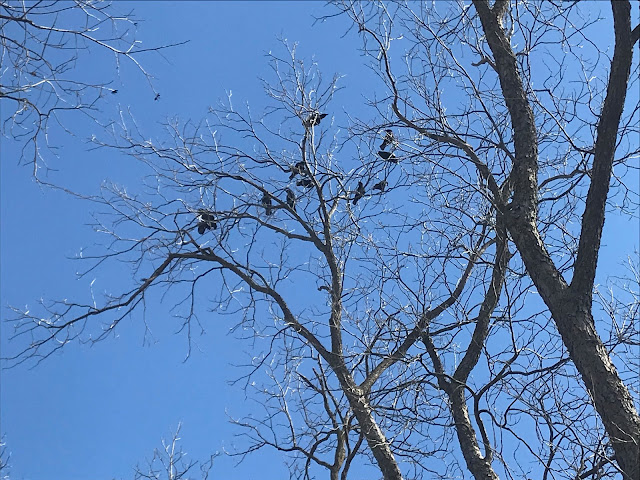 |
| Mammatus-ish clouds after this week's storm |
Seasonal changes always cause mischief around north Texas. This year's wind- and hail-storms and wildfires on the cusp of spring seem more frequent and more intense than usual, although I'm too lazy to look up the stats. Counties to the east are burning, and under emergency evacuation notices. We've had two thunderstorms (with golfball to baseball sized hailstones in some areas) in the last two weeks, resulting in swarms of roofing companies in local neighborhoods with offers to repair roof damage that's "visible from the street" (it is not, in most cases). Our big cable-spool picnic table out back has been artfully polka-dotted, but we've avoided any major damage--although in a previous windstorm a very large elm branch broke off and knocked things about, fortunately missing the greenhouse.
But today is lovely. Daffodils are fully in bloom, and the grape hyacinths are popping up all over. Both have been naturalizing over the property during the last twenty years, and their numbers have increased significantly. It's as if our old house is gussying herself up to celebrate her centennial this year. Our "house clock" seems to be off by a day this year (the first sunrise appeared through the window yesterday), probably because of precessing equinoxes, but the shift to Daylight Saving Time has meant extra time in the evening to potter around and get things done in the garden.
Clocks have been on many minds these days, especially since there may be a significant change in the works. For many, many years now I've been seasonally annoyed by the spring and fall changing of our clocks to and from "Central Standard Time" to "Central Daylight Time." I get so discombobulated by the shift that I've often grumbled about why we still do it at all. This week, however, the United States Senate agreed with me and voted unanimously to make Daylight Saving Time year-round. I like having more sun in the evening to enhance Animal Companionship Time when the weather's fine, so I'd rather this be the choice--even though sleep experts seem to think that standard time is preferable. And if we want the entire country and its territories to be uniform, we should adopt uniform standard time, so that those who don't ever follow daylight time won't still be different from everybody else. I don't really care; I just want to stop switching back and forth. Every year it seems to take me longer to adjust, although that seems a trivial complaint these days.
The usual celebrations of spring around this house have been severely muted by the war in Ukraine. We've stayed up later at night watching commentary from Hungary and elsewhere about the plight of the Ukrainian people, and feel no real impulse to celebrate anything (even though Purim, St. Patrick's Day, and Holi were all on the menu). We're sending money that would otherwise go to frivolities (like more books) to charities we regularly support that are also aiding the relief effort in Ukraine, as well as to international animal welfare groups trying to rescue lost and abandoned pets. There's not much more we can do, except perhaps share our concern with fellow bloggers and readers, and urge people to rely on news organizations that report factually and avoid the ones that don't. Newspeople are risking their own lives to get the story out, and I'm particularly sympathetic to what their families must be going through. My own mother was a foreign correspondent during the aftermath of the second of the Taiwan Strait Crises (1958-59), and my father had been deployed to Taiwan at the last minute (we were scheduled to go to the Philippines) because of the threat of war. I'm not sure why the whole family was allowed to go, but I grew up with photos of the damage done by the shellings and a political climate colored by the possibility of nuclear war. The Russia-Ukraine conflict is currently being compared to that of the recurring China-Taiwan issues, so it all seems uncomfortably familiar.
In addition, recent events keep reminding me of my maternal grandfather, who served as a medic toward the end of WWI in France. I've finished transcribing his letters to my grandmother, and have lately remembered a poem Sara Teasdale published in 1917 in response to reports of casualties in Europe. I stole the title, "Spring in Wartime," for this post.
I feel the spring far off, far off,
The faint, far scent of bud and leaf—
Oh, how can spring take heart to come
To a world in grief,
Deep grief?
The sun turns north, the days grow long,
Later the evening star grows bright—
How can the daylight linger on
For men to fight,
Still fight?
The grass is waking in the ground,
Soon it will rise and blow in waves—
How can it have the heart to sway
Over the graves,
New graves?
Under the boughs where lovers walked
The apple-blooms will shed their breath—
But what of all the lovers now
Parted by Death,
Grey Death?
I hope fervently that by the time the autumnal equinox rolls around (and preferably much sooner) there will be cause to celebrate, and that the wanton killing will have ended, and the Ukrainian people will no longer be threatened by autocratic ambition and hunger for power. The fortitude and resilience of Ukraine's president and citizens is profoundly inspiring. May it be rewarded with peace and freedom.
Image note: Almost-mammatus clouds after last week's hailstorm. Mammatus clouds are often a tornado omen, but these are rather less threatening. They provided for a gorgeous sunset, and folks to the north were treated to a huge double rainbow. But we had better clouds.

